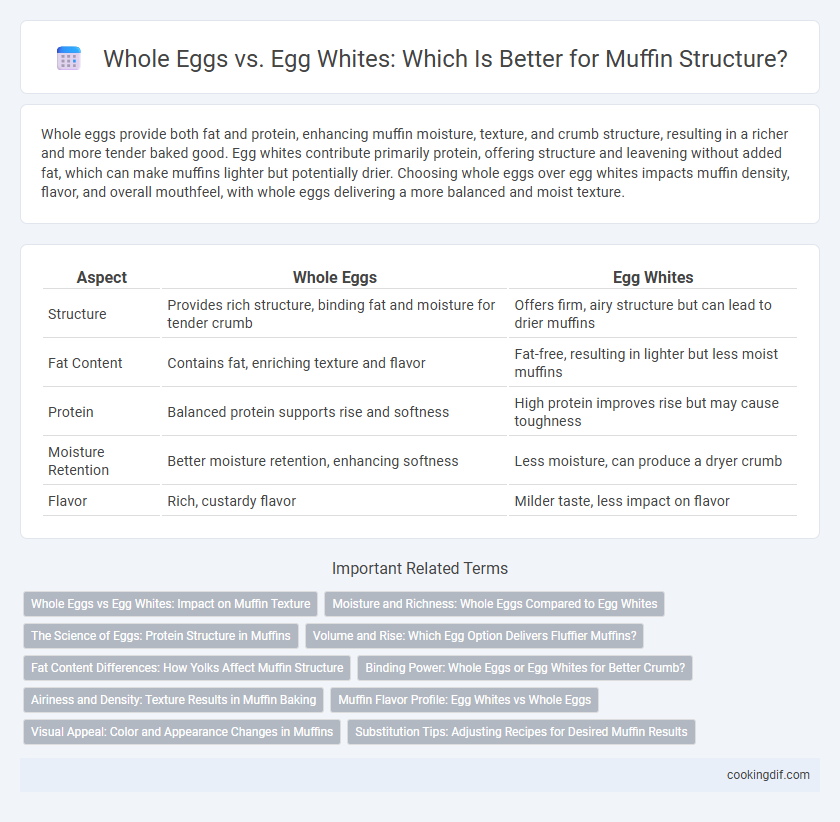Whole eggs provide both fat and protein, enhancing muffin moisture, texture, and crumb structure, resulting in a richer and more tender baked good. Egg whites contribute primarily protein, offering structure and leavening without added fat, which can make muffins lighter but potentially drier. Choosing whole eggs over egg whites impacts muffin density, flavor, and overall mouthfeel, with whole eggs delivering a more balanced and moist texture.
Table of Comparison
| Aspect | Whole Eggs | Egg Whites |
|---|---|---|
| Structure | Provides rich structure, binding fat and moisture for tender crumb | Offers firm, airy structure but can lead to drier muffins |
| Fat Content | Contains fat, enriching texture and flavor | Fat-free, resulting in lighter but less moist muffins |
| Protein | Balanced protein supports rise and softness | High protein improves rise but may cause toughness |
| Moisture Retention | Better moisture retention, enhancing softness | Less moisture, can produce a dryer crumb |
| Flavor | Rich, custardy flavor | Milder taste, less impact on flavor |
Whole Eggs vs Egg Whites: Impact on Muffin Texture
Whole eggs provide essential fats and proteins that contribute to a rich, tender muffin crumb and improved moisture retention. Egg whites, containing only protein and water, create a lighter, airier texture but may result in a drier muffin with less structural stability. Using whole eggs enhances the overall flavor and elasticity of the muffin, while egg whites promote a more delicate rise and porous crumb structure.
Moisture and Richness: Whole Eggs Compared to Egg Whites
Whole eggs contribute significantly to muffin moisture and richness due to their fat content in the yolk, enhancing tenderness and flavor depth. Egg whites provide structure and leavening but lack the fats necessary for optimal moisture, resulting in a lighter, less rich texture. Incorporating whole eggs creates a balanced crumb with both sturdiness and a moist, tender bite essential for high-quality muffins.
The Science of Eggs: Protein Structure in Muffins
Whole eggs provide a balanced mix of proteins and fats that contribute to muffin structure by creating a stable network during baking. Egg whites contain mostly albumin, a protein that coagulates to form a firm, elastic matrix, lending muffins a lighter, airier texture. The combination of yolk and white proteins in whole eggs optimizes moisture retention and crumb tenderness in muffins.
Volume and Rise: Which Egg Option Delivers Fluffier Muffins?
Whole eggs contribute both fat and protein, enhancing muffin volume and rise by creating a tender yet airy crumb structure. Egg whites, rich in protein but fat-free, promote greater aeration and lift, resulting in a fluffier texture with more pronounced volume. For maximum muffin fluffiness, incorporating egg whites maximizes rise, while whole eggs provide a balanced structure with added moisture.
Fat Content Differences: How Yolks Affect Muffin Structure
Whole eggs contain both yolks and whites, with yolks providing essential fats that enhance muffin texture and moisture retention. The higher fat content in yolks contributes to a tender crumb and richer flavor by emulsifying ingredients and trapping air during baking. Egg whites, lacking fats, primarily offer structure through protein coagulation but yield drier, less tender muffins compared to whole eggs.
Binding Power: Whole Eggs or Egg Whites for Better Crumb?
Whole eggs provide superior binding power in muffins due to the combination of yolk fats and egg white proteins, creating a more cohesive crumb structure. Egg whites alone contribute mainly protein, resulting in a lighter but less stable crumb that may crumble more easily. For optimal muffin texture and durability, whole eggs ensure better moisture retention and binding, enhancing crumb integrity.
Airiness and Density: Texture Results in Muffin Baking
Whole eggs contribute to a denser, richer muffin texture due to the fat and emulsifiers in the yolk, which enhance moisture and crumb structure. Egg whites, being primarily protein, trap air effectively during whipping, resulting in a lighter, airier muffin texture with increased volume. Balancing whole eggs and egg whites optimizes muffin structure by combining moisture retention and desired airiness for an ideal crumb.
Muffin Flavor Profile: Egg Whites vs Whole Eggs
Whole eggs enhance muffin flavor profiles by providing rich, creamy notes and a tender crumb due to their yolk's fat content, which also aids in moisture retention and browning. Egg whites contribute to lighter muffin structure with increased volume and a slightly drier texture, emphasizing the crumb's airiness rather than flavor depth. Using whole eggs results in a robust, well-rounded taste, while egg whites yield a more delicate flavor and a fluffier, less rich muffin.
Visual Appeal: Color and Appearance Changes in Muffins
Whole eggs contribute to a golden-brown crust and richer interior color in muffins due to their fat and yolk content, enhancing visual appeal. Egg whites produce a paler crumb and a lighter crust, often resulting in a less vibrant appearance. The lutein in egg yolks intensifies muffin coloration, making whole eggs preferable for a visually appealing, well-structured muffin.
Substitution Tips: Adjusting Recipes for Desired Muffin Results
Whole eggs provide both fat and protein, contributing to a richer muffin structure with moisture and tenderness, while egg whites offer primarily protein, promoting a lighter, more aerated crumb. When substituting egg whites for whole eggs, increase fat content by adding a small amount of oil or butter to maintain moisture and improve texture. For optimum muffin results, use two egg whites to replace one whole egg and consider adding 1 tablespoon of oil per egg omitted to preserve the desired softness and rise.
Whole eggs vs Egg whites for muffin structure Infographic

 cookingdif.com
cookingdif.com